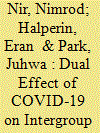| Srl | Item |
| 1 |
ID:
188828


|
|
|
|
|
| Summary/Abstract |
The coronavirus pandemic has fundamentally shifted the way human beings interact, both as individuals and groups, in the face of such a widespread outbreak. This paper seeks to investigate the effects of COVID-19 on intergroup emotions and attitudes within an intractable intergroup conflict, specifically, through the lens of the Korean conflict. Using a two-wave, cross-sectional design, this study was able to track the profound psychological changes in intergroup emotions and attitudes both prior to the pandemic and during its onslaught. Results of these two wave representative samples show that South Korean citizens demonstrated higher levels of fear of their neighbors in North Korea after the outbreak of COVID-19 than before. In turn, this led to increased societal support of hostile government policies towards North Koreans. Conversely, the same participants exhibited higher levels of empathy towards North Koreans during the pandemic, which led to a higher willingness to collaborate with their outgroup. This dual effect on intergroup emotions within intractable conflicts brings forth new avenues from which societies may be able to restrain the destructive influence of the COVID-19 threat on intergroup relations — as well as harvesting its constructive potential for reconciling warring intergroup relations.
|
|
|
|
|
|
|
|
|
|
|
|
|
|
|
|
| 2 |
ID:
170115


|
|
|
|
|
| Summary/Abstract |
We aim to verify how identifications (South Korean identification and ethnic identification) directly and indirectly influence the attitude toward Korean unification through the perception of North Korea (hostile vs. cooperative). Based on national wide survey data (N = 1,000), we investigated the structural relationships among the variables using a structural equation model. The research results reveal that (1) ethnic identification and South Korean identification and cooperative perception and confrontational perception toward North Korea are distinguishable concepts respectively; (2) ethnic identification has a direct effect on positive attitude toward unification and also has an indirect effect on one's attitude through cooperative North Korea perception; and (3) South Korean identification has a direct but negative influence on positive attitude toward unification but does not have a significant influence on perception toward North Korea. The implications of the research are discussed.
|
|
|
|
|
|
|
|
|
|
|
|
|
|
|
|